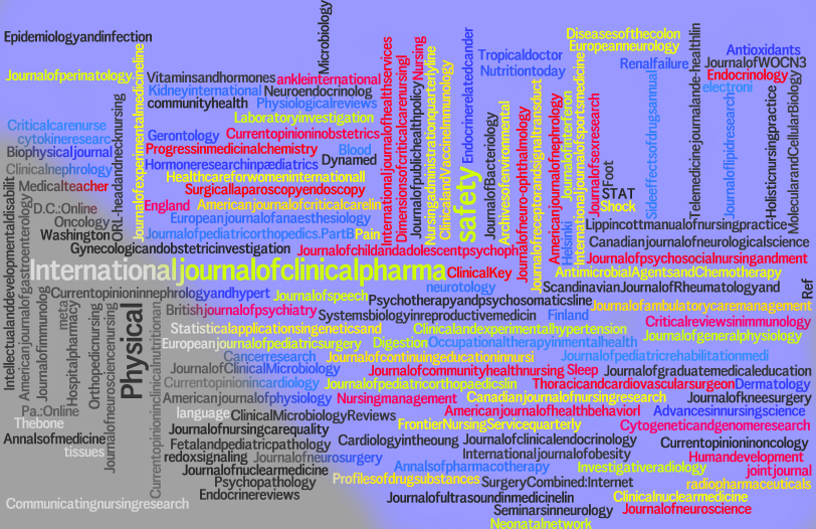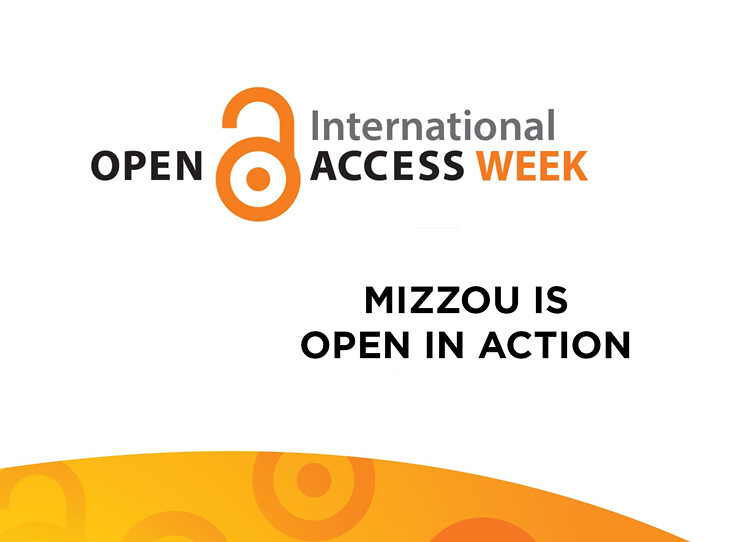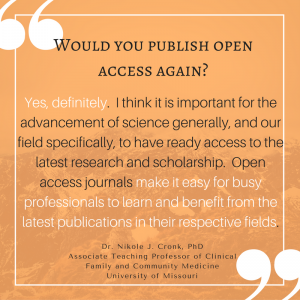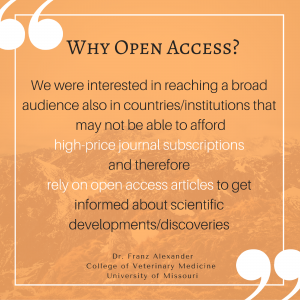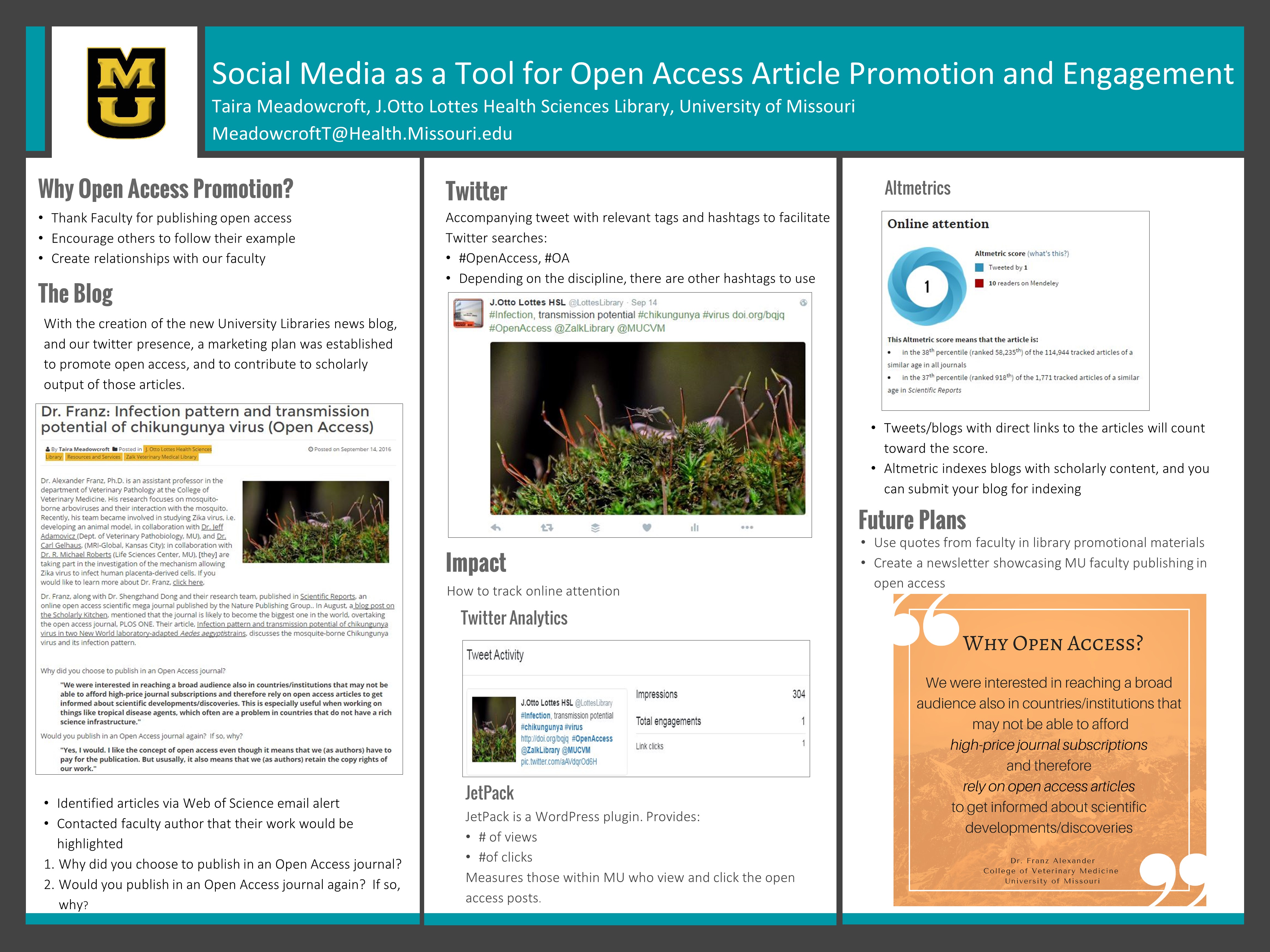See below for University of Missouri authored articles added to Scopus in the last 30 days from medicine and related fields. Click here for an explanation on how these searches are run monthly to identify articles and how the lists are compiled.
View the rest of the list in Scopus, or view recent MU authored articles from other disciplines (in Firefox or Chrome).
Recent University of Missouri Publications- Medicine and Related Fields:
- Hawks, Z., Shimony, J., Rutlin, J., Grange, D.K., Christ, S.E., White, D.A. Pretreatment cognitive and neural differences between sapropterin dihydrochloride responders and non-responders with phenylketonuria
- Tran, T.M., Hampton, C.S., Brossard, T.W., Harmata, M., Robertson, J.D., Jurisson, S.S., Braun, D.M. In vivo transport of three radioactive [18F]-fluorinated deoxysucrose analogs by the maize sucrose transporter ZmSUT1
- Conn, V.S., Ruppar, T.M. Medication adherence outcomes of 771 intervention trials: Systematic review and meta-analysis
- Fung, C.K., Moore, M.M., Karcher, N.R., Kerns, J.G., Martin, E.A. Emotional word usage in groups at risk for schizophrenia-spectrum disorders: An objective investigation of attention to emotion
- Mastren, T., Radchenko, V., Bach, H.T., Balkin, E.R., Birnbaum, E.R., Brugh, M., Engle, J.W., Gott, M.D., Guthrie, J., Hennkens, H.M., John, K.D., Ketring, A.R., Kuchuk, M., Maassen, J.R., Naranjo, C.M., Nortier, F.M., Phelps, T.E., Jurisson, S.S., Wilbur, D.S., Fassbender, M.E. Bulk production and evaluation of high specific activity 186gRe for cancer therapy using enriched 186WO3 targets in a proton beam
- O’Daniels, S.T., Kesler, D.C., Mihail, J.D., Webb, E.B., Werner, S.J. Functional visual sensitivity to ultraviolet wavelengths in the Pileated Woodpecker (Dryocopus pileatus), and its influence on foraging substrate selection
- Gamal-Eldeen, A.M., Moustafa, D., El-Daly, S.M., Abo-Zeid, M.A.M., Saleh, S., Khoobchandani, M., Katti, K., Shukla, R., Katti, K.V. Gum Arabic-encapsulated gold nanoparticles for a non-invasive photothermal ablation of lung tumor in mice
- Khalilpour, S., Latifi, S., Behnammanesh, G., Majid, A.M.S.A., Majid, A.S.A., Tamayol, A. Ischemic optic neuropathy as a model of neurodegenerative disorder: A review of pathogenic mechanism of axonal degeneration and the role of neuroprotection
- Li, Y., Allen, J., Casillas, A. Relating psychological and social factors to academic performance: A longitudinal investigation of high-poverty middle school students
- Hossain, M.S., Kawakatsu, T., Kim, K.D., Zhang, N., Nguyen, C.T., Khan, S.M., Batek, J.M., Joshi, T., Schmutz, J., Grimwood, J., Schmitz, R.J., Xu, D., Jackson, S.A., Ecker, J.R., Stacey, G. Divergent cytosine DNA methylation patterns in single-cell, soybean root hairs
- Maxfield, M., Pyszczynski, T., Greenberg, J., Bultmann, M.N. Age Differences in the Effects of Mortality Salience on the Correspondence Bias
- Su, H., Liu, Y., Dong, Q., Feng, C., Zhang, J., Liu, Y., Birchler, J.A., Han, F. Dynamic location changes of Bub1-phosphorylated-H2AThr133 with CENH3 nucleosome in maize centromeric regions
- Liu, S., Kandoth, P.K., Lakhssassi, N., Kang, J., Colantonio, V., Heinz, R., Yeckel, G., Zhou, Z., Bekal, S., Dapprich, J., Rotter, B., Cianzio, S., Mitchum, M.G., Meksem, K. The soybean GmSNAP18 gene underlies two types of resistance to soybean cyst nematode
- Franklin, C.L., Ericsson, A.C. Microbiota and reproducibility of rodent models
- Walters, E.M., Wells, K.D., Bryda, E.C., Schommer, S., Prather, R.S. Swine models, genomic tools and services to enhance our understanding of human health and diseases
- Jaffey, J.A., Williams, K.J., Masseau, I., Krueger, M., Reinero, C. Vasoproliferative process resembling pulmonary capillary hemangiomatosis in a cat
- Jing, L., Guo, D., Hu, W., Niu, X. The prediction of a pathogenesis-related secretome of Puccinia helianthi through high-Throughput transcriptome analysis
- Hiestand, M., Abdel Jalil, A., Castell, D.O. Manometric Subtypes of Ineffective Esophageal Motility
- Huang, P., Lee, M.W., Jr., Sadrerafi, K., Heruth, D.P., Zhang, L.Q., Maulik, D., Ye, S.Q. MC-PPEA as a new and more potent inhibitor of CLP-induced sepsis and pulmonary inflammation than FK866
- Kuhlmann, P.K., DeLay, K.J., Anaissie, J., Hellstrom, W.J.G., Yafi, F.A. Collagenase Clostridium histolyticum in the treatment of peyronie’s disease: Patient selection and perspectives
View the rest of the list in Scopus, or view recent MU authored articles from other disciplines (in Firefox or Chrome).
Top Ten Journals by Impact Factor
| Journal Title | Impact Factor |
| Journal Of The American Chemical Society | 13.038 |
| Nature Communications | 11.329 |
| New Phytologist | 7.21 |
| Plos Pathogens | 7.003 |
| Human Molecular Genetics | 5.985 |
| Oncotarget | 5.008 |
| Human Reproduction | 4.621 |
| Journal Of Lipid Research | 4.368 |
| Frontiers In Microbiology | 4.165 |
| Genome Biology And Evolution | 4.098 |








